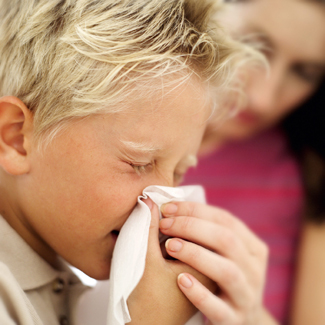Nosebleeds
 Nosebleeds are bleeding from the small blood vessels inside the nostrils (the two holes of the nose). Usually the bleeding comes from the mucous membrane that lines the inside of the nose. The medical name for a nosebleed is epistaxis. A nosebleed is often caused by breathing very dry air, nose picking, or sneezing and strong nose blowing when you have a cold. Nosebleeds can be a frequent and frustrating symptom of VWD and platelet disorders.
Nosebleeds are bleeding from the small blood vessels inside the nostrils (the two holes of the nose). Usually the bleeding comes from the mucous membrane that lines the inside of the nose. The medical name for a nosebleed is epistaxis. A nosebleed is often caused by breathing very dry air, nose picking, or sneezing and strong nose blowing when you have a cold. Nosebleeds can be a frequent and frustrating symptom of VWD and platelet disorders.
How to treat a nosebleed:
- Tilt your head forward so the blood will not run down your throat. Tilting forward also helps you tell when the bleeding has stopped.
- Weak, stringy, jelly-like clots of blood will form. These are not strong enough to stop the bleeding. They keep good clots from forming. Gently blow these weak clots out of your nose.
- Press the sides of the nose together firmly. Nose clips are available to help do this. You may have to hold pressure for five to twenty minutes for the bleeding to stop.
- If holding your nose does not work, try putting an ice pack over the bridge of your nose. The cold will help close the blood vessels.
Remember these things, too:
- People with hemophilia usually do not need to take factor concentrate for nosebleeds that do not last long.
- Severe nosebleeds are sometimes treated by burning the blood vessels in the nose (cauterization) or forceful packing of the nose. These should not be used on a person with hemophilia. They can cause even more nosebleeding.
- Dark yellow or green mucus coming from your nose may mean you have an infection. See a doctor.
- You may throw up (vomit) after a nosebleed because the blood you swallow upsets your stomach.
- If you swallow blood during your nosebleed, you may notice tar-like stools later when you have a bowel movement. This is normal.
- After your nosebleed, you can put Neo-Synephrine® drops in your nose. They will constrict the blood vessels so they bleed less. Neo-Synephrine® drops should not be used more than three days in a row.
- Don’t drink hot liquids after having a nosebleed. The heat can open up (dilate) the blood vessels in your nose. The bleeding can start again.
- Nosebleeds that last a long time can lower your red blood cell count (cause anemia).
How to prevent nosebleeds:
- Keep the inside of your nose moist so that it doesn't crust over, crack, and bleed. Put a little Vaseline® in each nostril to hold in the moisture during cold weather. Ayr® Gel, available at most drugstores, can also help keep your nose moist.
- Use a vaporizer or humidifier to keep air in a room moist during the cold, dry months. The moisture in the air will keep your nose from drying out. You will be less likely to pick your nose. Clean out the humidifier every day to keep germs from growing in the water.
Call your doctor or treatment center if:
- The nosebleed lasts longer than usual or is a very bad one.
- You think you may need to take factor. Go ahead and infuse the factor, but call the doctor too. If your nosebleed is bad enough to need factor, the doctor may want to find out what caused it. A child's nose may have something stuck in it.
- You have nosebleeds often. If you lose a lot of blood this way, you may need to be checked for anemia (low blood).
- Your nosebleed was caused by an injury to your head or face.
- You think you may have an infection.
